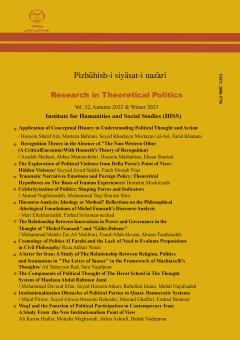The Components of Political Thought of The Herat School in The Thought System of Maulana Abdul Rahman Jami
Subject Areas : پژوهش سیاست نظری
Mohammad dawood Erfan
1
![]() ,
Seyed Hossein Athari
2
,
Seyed Hossein Athari
2
![]() ,
Ruhollah Islami
3
,
Ruhollah Islami
3
![]() ,
Mahdi Najafzade
4
,
Mahdi Najafzade
4
![]()
1 - PhD student of political thought, Ferdowsi University of Mashhad, Iran.
2 - Associate Professor, Department of Political Science, Ferdowsi University of Mashhad, Iran.
3 - Assistant Professor, Department of Political Science, Ferdowsi University of Mashhad, Iran.
4 - Associate Professor, Department of Political Science, Ferdowsi University of Mashhad, Iran.
Keywords: Jami, political mysticism of Naqshbandiyya, teachings of ancient Iran, Timurids, justice and Sharia.,
Abstract :
Mehdi Najafzadeh**** Herat was formerly one of the important centers of Islamic thought and power withinthe Khorasan school. This city has been the place of emergence of great scientists and thinkers throughout the history. During the period of Timurids (14th century C.E.), connection of thought and power eventually led to the emergence of the political school of Herat. Abdur Rahman Jami, as the leader of this school, played an undeniable role in the growth and excellence of Herat's political school. Jami was an intellectual mentor who made the interaction of mysticism and politics possible for the first time in the history of Islam. The Timurid power system and court was soon influenced by Jami's thought and crystallized in the behavior and actions of political agents in the context of the society .This article seeks to answer the question of what constituted Jami's political thought that helped shape the political school of Herat? This article, with the goal-legitimacy framework of "John Murrow" and Quentin Skinner's interpretive hermeneutic method, aims to examine the most important concepts produced by Jami's thought thatentered into the political system of his era by him and his students.
